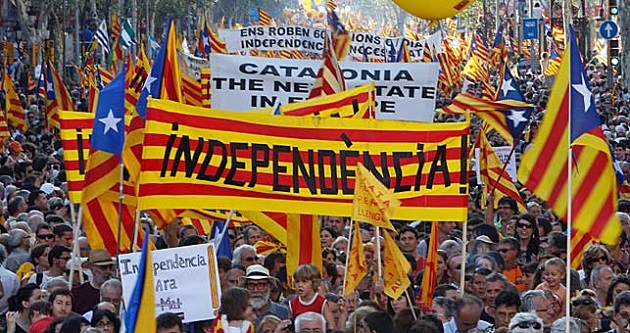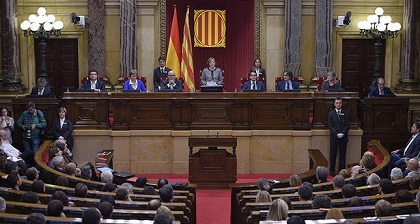Unilateral “disconnection” planned after a vote on October, 1. The Spanish Prime Minister defines it as a “democratic fraud”. Evangelicals called to be a model of reconciliation.
 A pro-independence demonstration in Catalonia, Spain.
A pro-independence demonstration in Catalonia, Spain.
After a long and heated debate, the regional parliament of Catalonia (Spain) has voted in favour of the ‘Referendum Law’ which will would allow Catalan citizens to vote “yes” or “no” to independence.
During the debate, the pro-unity parties in the parliament have called to stop the vote because it collides with the Spanish Constitution, and therefore is “illegal”.
Prime Minister Mariano Rajoy said the Spanish government is ready to react in the face of a “democratic fraud”. Spain’s main opposition party, the Socialists, expressed its support for Rajoy in stopping the referendum. The Prime Minister has already asked the Spanish Constitutional Court to annuel the law.
Meanwhile, the Catalan government said the plans to hold the referendum will not be stopped. The date set is October, 1, and an advertising campaign was launched some days ago to call all Catalans to express their opinion on the “future of our nation”.
Surveys show there is a big divide in Catalonia between those who wish the region to become and independent state, and those who wish to remain in Spain. Research also shows that eight in ten Catalans would wish to vote on a binding referendum to decide its political future.
 The parliament of Catalonia.
The parliament of Catalonia. Former president of the Catalan government Artur Mas was sentenced on Monday to pay 5 Million Euro after he led the organisation of a previous similar referendum in November 2014. Then, 2.3 million people voted (37% of participation) and 80% voted in favour of independence, but the result was not binding.
In the last ten years, hundreds of thousands of people have taken part in annual demonstrations to demand the independence with slogans like “Catalonia, a new State in Europe”.
EVANGELICALS: “RELATIOSHIPS SHOULD NOT BE SHAPED BY POLITICAL DECISIONS”
Already in 2014, the Spanish Evangelical Alliance (AEE) expressed its concern about the tense social political climate around the Catalan issue.
Churches should be a constructive model and “their function is to bring hope and a message of salvation and restoration in the midst of the worst crisis”, the AEE said.
“We should not allow society, political decisions and geopolitical changes to shape our relationships as Christians”, because “we are God’s people and these gives ties us above any difference we might have”, evangelicals expressed.
At the same time, the Alliance defended the right of “individual members of churches to have legitimate diverse preferences, convictions and feelings on this issue”.

Las opiniones vertidas por nuestros colaboradores se realizan a nivel personal, pudiendo coincidir o no con la postura de la dirección de Protestante Digital.
Si quieres comentar o